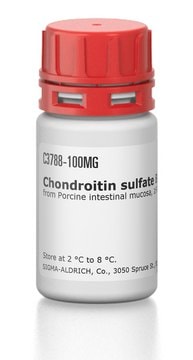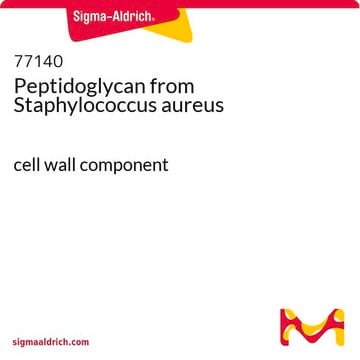H9395
α-Hemolysin from Staphylococcus aureus
lyophilized powder, Protein ~60 % by Lowry, ≥10,000 units/mg protein
Synonyme(s) :
α-Toxin
About This Item
Produits recommandés
Source biologique
Staphylococcus aureus
Niveau de qualité
Forme
lyophilized powder
Activité spécifique
≥10,000 units/mg protein
Contient
sodium citrate buffer as balance
Composition
Protein, ~60% Lowry
Solubilité
H2O: soluble 0.49-0.51 mg/mL
Numéro d'accès UniProt
Température de stockage
2-8°C
Informations sur le gène
Staphylococcus aureus ... SAOUHSC_01121(3920722)
Description générale
Application
- as a component of electrolyte solution for testing pore formation in lipid bilayer using electrophysiological measurements
- to test its osteogenesis suppressive effects in bone marrow stromal cells (BMSCs)
- in the preparation of α-hemolysin molecular imprinted polymer (MIP) for Biacore and surface plasmon resonance
Actions biochimiques/physiologiques
Conditionnement
Définition de l'unité
Mention d'avertissement
Warning
Mentions de danger
Conseils de prudence
Classification des risques
Eye Irrit. 2 - Skin Irrit. 2 - STOT SE 2
Organes cibles
Lungs,Blood
Code de la classe de stockage
11 - Combustible Solids
Classe de danger pour l'eau (WGK)
WGK 3
Point d'éclair (°F)
Not applicable
Point d'éclair (°C)
Not applicable
Équipement de protection individuelle
Eyeshields, Gloves, type N95 (US)
Certificats d'analyse (COA)
Recherchez un Certificats d'analyse (COA) en saisissant le numéro de lot du produit. Les numéros de lot figurent sur l'étiquette du produit après les mots "Lot" ou "Batch".
Déjà en possession de ce produit ?
Retrouvez la documentation relative aux produits que vous avez récemment achetés dans la Bibliothèque de documents.
Les clients ont également consulté
Notre équipe de scientifiques dispose d'une expérience dans tous les secteurs de la recherche, notamment en sciences de la vie, science des matériaux, synthèse chimique, chromatographie, analyse et dans de nombreux autres domaines..
Contacter notre Service technique
















